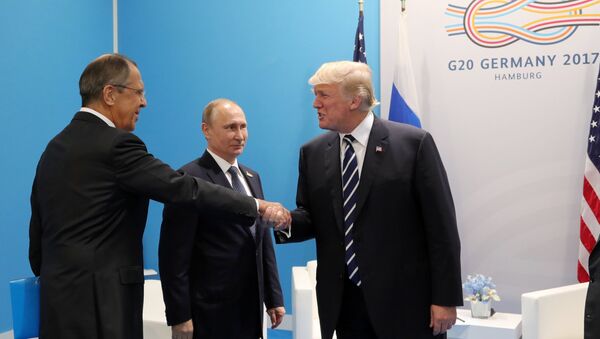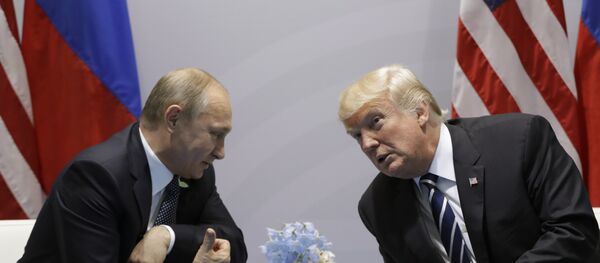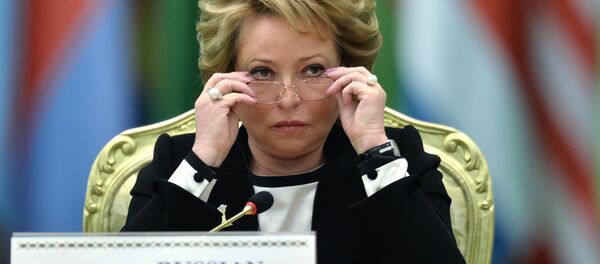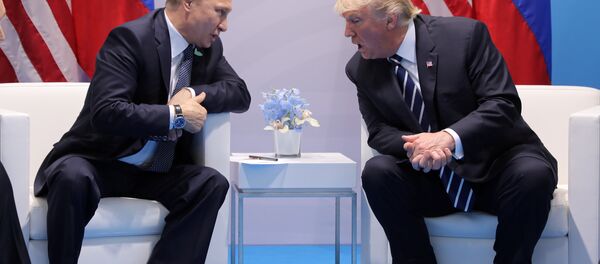Tillerson said that the meeting revealed "a very clear, positive chemistry" and connection between the two leaders, while Lavrov characterized the first bilateral as constructive.
All four main topics that the presidents addressed represent the bottlenecks in the current US-Russian elections. However, on each of them the leaders managed to see a way to move forward.
HACKERS
The first topic that the two addressed was, predictably, Russia’s alleged meddling in the US presidential election 2016.
Trump raised his concerns regarding Moscow’s alleged interference, and Putin once again denied any involvement by Russia.
Tillerson said that Putin's denial was seen as a hindrance to moving the relationship between the United States and Russia forward, and the two presidents agreed to establish a new framework to deal with the challenges of cyber threats and understand each other better on it.
"It was agreed that all these issues … will be the subject of Russian-American interaction," Lavrov confirmed.
SANCTIONS
Another bottleneck in the US-Russian relations is the remaining economic sanctions. Chemistry, however, helped even here.
Trump "took note of actions that have been discussed by the Congress most recently, additional sanctions that have been voted out of the Senate," Tillerson said. But the two presidents at this moment preferred to "focus on how we move forward from here," he added.
The United States will try to secure the Russian government’s commitment not to interfere in US affairs in the future, according to the state secretary.
In December 2016, former US President Barack Obama’s administration approved a sanctions package against Russia due to its alleged meddling into the 2016 US elections. The measures included barring of access to two diplomatic compounds in use by the Russian Embassy in Washington and Russia’s Permanent Mission to the United Nations in New York. Russia denied the allegations and stressed that it did not seek to influence elections abroad.
SYRIA
At their first face-to-face meeting in the German port city, the Russian and the US presidents also managed to give a logical continuation to Syria peace talks hosted by Astana, which wrapped up just a day before.
Up until Wednesday, three ceasefire guarantor states – Russia, Turkey and Iran – with help of Jordan and the United states as observers have been trying to coordinate a whole range of specifics of the establishment of four de-escalation zones in Syria. They could not agree on all the details and sign a package of documents, but clearly committed to continue work at the expert level.
"Experts from Russia, the United States and Jordan completed today the work in the capital of Jordan, Amman. They agreed a memorandum on the establishment of a deescalation zone in southwestern Syria: in Daraa, Quneitra and As-Suwayda provinces, which will have a ceasefire in force from midday, Damascus time, on July 9," Lavrov told reporters immediately after the Trump-Putin meeting.
Thus, Russia and the US have pledged to ensure the implementation of the ceasefire in that region of Syria, starting July 9.
Security around the country’s southwest will be provided by Russian military police in coordination with the Americans and Jordanians.
Tillerson, in turn, noted that this coordination would be "the first show of success," and the two states hope to "replicate that elsewhere."
UKRAINE
Ukrainian conflict also could not escape the two leaders’ attention.
Russia is now expecting the new US envoy on Ukrainian settlement to visit Moscow in the near future for consultations, Lavrov said.
Other topics that were touched upon in a two-and-a-half-hour meeting include actions on the denuclearization of North Korea and speeding up the procedures to appoint new ambassadors to Moscow and Washington.
Generally, the first top-level bilateral can be seen as a breakthrough. Not only because it took place and lasted five times longer than expected, making all summit participants and journalists impatient about the outcome, but also because the leaders took the healthiest possible approach – looking into future instead of dwelling on the past.





